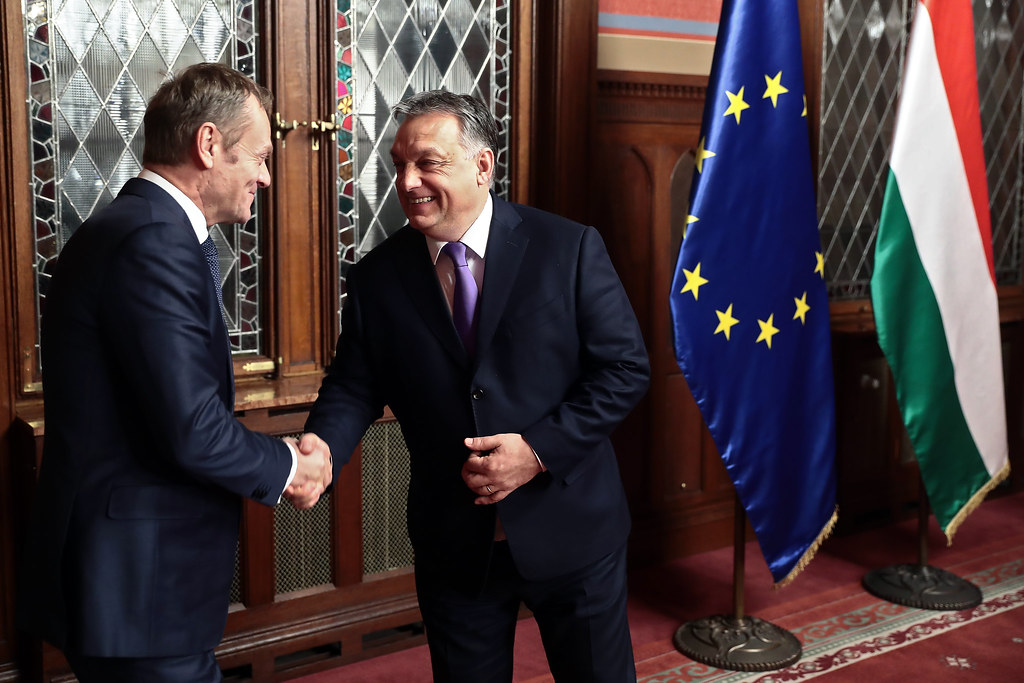Warsaw wonders whether this will be the country’s moment to shine, while Orban gloats about a vindication of his world view. From Respekt.
In the past week, the whole world has been talking about what happened at the Munich Security Conference and what exactly the new U.S. administration will do. In Warsaw and Budapest, they have particularly good reasons to analyze the events of the last few days, even though the reasons may be different.
In Poland, they’re trying to find out whether a historic calamity is about to visit them, or whether it will be their moment to shine. The Hungarian government, for its part, is feeling a sense of satisfaction.
Poland is not at all in a bad position. In a world where the U.S. vice president is shamelessly lecturing his allies about democracy and values, Poland is not lost. Before the U.S. presidential election, Polish Prime Minister Donald Tusk and his center-right government took extra care not to say anything regarding Trump’s probable second term that could hurt their country in the future.
On the one hand, nobody can deny that Poland is a major ally of Ukraine’s (even though their relations have recently become more complicated). On the other hand, Tusk and Foreign Minister Radek Sikorski can claim that they also have correct relations with Trump’s people – or at the very least, nothing is preventing those relations from being correct.
Poland has consistently held a positive attitude toward the United States; it is spending more (per capita, of course) on defense than Washington; and it was the only representative of Central and Eastern Europe at the recent informal summit on Ukraine that was held in Paris. (Which is logical, given that it is by far the largest EU country from the region.)
If Europe really decides to defend itself on its own, without the Americans, or is forced to do so and rises to the occasion, Poland will play an important part in Europe’s defense. – whether that’s because of geography, or because of the strength of its armed forces, which is already significant.
Nevertheless, Polish politicians are not too happy about how Trump and his people have been proceeding. In his speeches, Tusk has limited himself to addressing a European audience. He said Europe should work on being able to decide on global affairs. Otherwise, the decisions will be made by others, and the Europeans won’t like it.
Foreign Minister Sikorski, who likes to make strong pronouncements, has told the Americans that if they want to act on their own, they should realize that what’s at stake is not just the trustworthiness of Trump and of the people chosen by him, but also that of all of America.
He added that while U.S. negotiation methods sure look unusual, they might work – which is probably the only realistic approach to a situation where you, as Europe, think that you should be sitting at the negotiation table, but someone else might not agree. Certainly not those who are already setting the table.
In Hungary, in contrast, there’s an air of calm and contentment.The biggest political event of recent days was the conference of the main opposition party Tisza, led by Peter Magyar. In his regular Friday radio interview, Viktor Orban did not mention the conference at all. He only rarely talks about his current challenger – in fact, never.
Orban just said that the Hungarians should trust themselves to follow their own policies and their own way. In his opinion, only Pope Francis, Trump, and Orban himself have managed to do this when it comes to the war in Ukraine.
The prime minister claims the current developments represent not just a political victory. It is also a spiritual victory, because Hungary, unlike almost all of the rest of the EU, has not forgotten that peace is of the highest value. Certainly higher than ecology and gender theories, which, he says, are what’s most prized in the West.
It does not make him happy that he turns out to have been right, as he was also on the subject of migration. But now that he has been vindicated, it is important to note that this will also be an economic victory for Hungary, which is something no one should forget. He is certain Russia will be fully re-integrated into the global economy, and even into the European energy sector. “And Hungary will profit a great deal from the peace,” he told his listeners.
…
Tomas Brolik is deputy editor-in-chief of Respekt, the leading Czech newsweekly where this article originally appeared. Republished by permission. Translated by Matus Nemeth.
